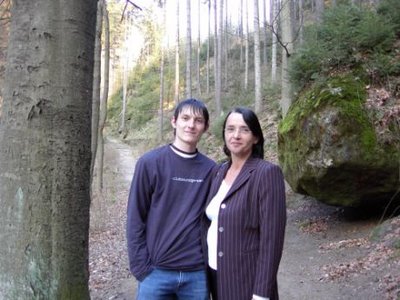 Friends in the kitchen preparing a meal...
Friends in the kitchen preparing a meal...Many from the USA notice the more serious or even bored expressions on people’s faces in Europe. Yes, Americans smile and laugh all the time, and most people over here admire this easy-goingness in the USA. But these traits do not exist by themselves; they are manifestations of substantial ways of interfacing with people in groups and as individuals.
In the USA I think Will Rogers said it best, “I never met a man I didn’t like.” And in Germany you have the phrase “Trust is good, but control is better.” Since I am probably writing for a predominantly American audience (Verzeih mir bitte, die Ihr dies lesen könnt!) I will focus on the German aspects here. The American tends to be open and curious; isn’t it cool to meet new people and find out new things! Well, yes it is, of course. But many here often think, “Who knows what kind of a person this really is; I don’t want to start something I will regret later!” And, in Germany we pay much more attention to detail, especially in dealing with people. Your conversation partner will notice everything you say and everything you don’t say, and your body language, voice inflection, posture, clothing style, it is all registered and stored to help construct their dossier of you. Then, when you have down time alone, you sift through the dossier and come to decisions, whether you want to get to know the person better or leave it at more of a distance. Then, if you decide to move closer, and if you are on a last name basis (using the formal form of address), you offer your first name and the informal form of address to the person. If you were already using first names, then you usually tell some detail about yourself or use a more special greeting with the person. This is an important barrier you cross, because this is now a relationship of trust and mutual support – you are both friends – a word used carefully here. This can sometimes require months, and sometimes some difficult situations in which you don’t know if you should venture more openness or stay reserved.
In a friendship much more openness on both sides is assumed, and this includes the readiness to criticize each other’s actions. But one thing is critical: a friend will stand by a friend to the end, regardless of what may come. This means that in test situations some will cheat helping their friends to pass a test. In socialist East Germany your friends warned you about spies and helped you find food and goods you could not get otherwise. And so, the outside world is brutal, cold, and you don’t know the people or what they want, so you don’t give them anything to use against you, which also means you don’t smile in many situations. Here control is better; you control yourself and keep distance from others. When you meet a friend, trust takes over: the greeting makes it obvious that these are friends: the personal space is closer, they may even touch each other longer, and always start by asking and telling in detail how they are doing.
It was difficult for me in the beginning; you traverse a great distance going from stranger to acquaintance to friend here. While I still value the openness of American society, I cannot imagine my life without the friends I have and am making in Germany, for they are what make life here so special and rewarding for me.
















































